- Home
- H. Rider Haggard
The Ivory Child
The Ivory Child Read online
Produced by John Bickers; Emma Dudding; Dagny
THE IVORY CHILD
by H. Rider Haggard
CHAPTER I
ALLAN GIVES A SHOOTING LESSON
Now I, Allan Quatermain, come to the story of what was, perhaps, one ofthe strangest of all the adventures which have befallen me in the courseof a life that so far can scarcely be called tame or humdrum.
Amongst many other things it tells of the war against the Black Kendahpeople and the dead of Jana, their elephant god. Often since then Ihave wondered if this creature was or was not anything more than a meregigantic beast of the forest. It seems improbable, even impossible, butthe reader of future days may judge of this matter for himself.
Also he can form his opinion as to the religion of the White Kendah andtheir pretensions to a certain degree of magical skill. Of this magicI will make only one remark: If it existed at all, it was by no meansinfallible. To take a single instance, Harut and Marut were convincedby divination that I, and I only, could kill Jana, which was why theyinvited me to Kendahland. Yet in the end it was Hans who killed him.Jana nearly killed me!
Now to my tale.
In another history, called "The Holy Flower," I have told how I came toEngland with a young gentleman of the name of Scroope, partly to see himsafely home after a hunting accident, and partly to try to dispose ofa unique orchid for a friend of mine called Brother John by the whitepeople, and Dogeetah by the natives, who was popularly supposed to bemad, but, in fact, was very sane indeed. So sane was he that he pursuedwhat seemed to be an absolutely desperate quest for over twenty years,until, with some humble assistance on my part, he brought it to acuriously successful issue. But all this tale is told in "The HolyFlower," and I only allude to it here, that is at present, to explainhow I came to be in England.
While in this country I stayed for a few days with Scroope, or, rather,with his fiancee and her people, at a fine house in Essex. (I called itEssex to avoid the place being identified, but really it was one of theneighbouring counties.) During my visit I was taken to see a much finerplace, a splendid old castle with brick gateway towers, that had beenwonderfully well restored and turned into a most luxurious moderndwelling. Let us call it "Ragnall," the seat of a baron of that name.
I had heard a good deal about Lord Ragnall, who, according to allaccounts, seemed a kind of Admirable Crichton. He was said to bewonderfully handsome, a great scholar--he had taken a double first atcollege; a great athlete--he had been captain of the Oxford boat at theUniversity race; a very promising speaker who had already made his markin the House of Lords; a sportsman who had shot tigers and other largegame in India; a poet who had published a successful volume of verseunder a pseudonym; a good solider until he left the Service; and lastly,a man of enormous wealth, owning, in addition to his estates, severalcoal mines and an entire town in the north of England.
"Dear me!" I said when the list was finished, "he seems to have beenborn with a whole case of gold spoons in his mouth. I hope one of themwill not choke him," adding: "Perhaps he will be unlucky in love."
"That's just where he is most lucky of all," answered the young lady towhom I was talking--it was Scroope's fiancee, Miss Manners--"for he isengaged to a lady that, I am told, is the loveliest, sweetest, cleverestgirl in all England, and they absolutely adore each other."
"Dear me!" I repeated. "I wonder what Fate _has_ got up its sleeve forLord Ragnall and his perfect lady-love?"
I was doomed to find out one day.
So it came about that when, on the following morning, I was asked ifI would like to see the wonders of Ragnall Castle, I answered "Yes."Really, however, I wanted to have a look at Lord Ragnall himself, ifpossible, for the account of his many perfections had impressed theimagination of a poor colonist like myself, who had never found anopportunity of setting his eyes upon a kind of human angel. Human devilsI had met in plenty, but never a single angel--at least, of the malesex. Also there was always the possibility that I might get a glimpseof the still more angelic lady to whom he was engaged, whose name,I understood, was the Hon. Miss Holmes. So I said that nothing wouldplease me more than to see this castle.
Thither we drove accordingly through the fine, frosty air, for the monthwas December. On reaching the castle, Mr. Scroope was told that LordRagnall, whom he knew well, was out shooting somewhere in the park, butthat, of course, he could show his friend over the place. So we wentin, the three of us, for Miss Manners, to whom Scroope was to be marriedvery shortly, had driven us over in her pony carriage. The porter at thegateway towers took us to the main door of the castle and handed us overto another man, whom he addressed as Mr. Savage, whispering to me thathe was his lordship's personal attendant.
I remember the name, because it seemed to me that I had never seenanyone who looked much less savage. In truth, his appearance was thatof a duke in disguise, as I imagine dukes to be, for I never set eyeson one. His dress--he wore a black morning cut-away coat--was faultless.His manners were exquisite, polite to the verge of irony, but with ahint of haughty pride in the background. He was handsome also, with afine nose and a hawk-like eye, while a touch of baldness added to thegeneral effect. His age may have been anything between thirty-five andforty, and the way he deprived me of my hat and stick, to which Istrove to cling, showed, I thought, resolution of character. Probably, Ireflected to myself, he considers me an unusual sort of person who mightdamage the pictures and other objects of art with the stick, and notseeing his way how to ask me to give it up without suggesting suspicion,has hit upon the expedient of taking my hat also.
In after days Mr. Samuel Savage informed me that I was quite rightin this surmise. He said he thought that, judging from my somewhatunconventional appearance, I might be one of the dangerous class of whomhe had been reading in the papers, namely, a "hanarchist." I write theword as he pronounced it, for here comes the curious thing. This man,so flawless, so well instructed in some respects, had a fault which gaveeverything away. His h's were uncertain. Three of them would come quiteright, but the fourth, let us say, would be conspicuous either byits utter absence or by its unwanted appearance. He could speak, whendescribing the Ragnall pictures, in rotund and flowing periods thatwould scarcely have disgraced the pen of Gibbon. Then suddenly that"h" would appear or disappear, and the illusion was over. It was like asudden shock of cold water down the back. I never discovered the originof his family; it was a matter of which he did not speak, perhapsbecause he was vague about it himself; but if an earl of Norman bloodhad married a handsome Cockney kitchenmaid of native ability, I canquite imagine that Samuel Savage might have been a child of the union.For the rest he was a good man and a faithful one, for whom I have ahigh respect.
On this occasion he conducted us round the castle, or, rather, its morepublic rooms, showing us many treasures and, I should think, at leasttwo hundred pictures by eminent and departed artists, which gave him anopportunity of exhibiting a peculiar, if somewhat erratic, knowledge ofhistory. To tell the truth, I began to wish that it were a little lessfull in detail, since on a December day those large apartments feltuncommonly cold. Scroope and Miss Manners seemed to keep warm, perhapswith the inward fires of mutual admiration, but as I had no one toadmire except Mr. Savage, a temperature of about 35 degrees produced itsnatural effect upon me.
At length we took a short cut from the large to the little gallerythrough a warmed and comfortable room, which I understood was LordRagnall's study. Halting for a moment by one of the fires, I observeda picture on the wall, over which a curtain was drawn, and asked Mr.Savage what it might be.
"That, sir," he replied with a kind of haughty reserve, "is the portraitof her future ladyship, which his lordship keeps for his private heye."
Miss Manners sniggered, and I said:
"Oh, thank you. What an ill-omened kind of thing to do!"
Then, observing through an open door the hall in which my hat had beentaken from me, I lingered and as the others vanished in the littlegallery, slipped into it, recovered my belongings, and passed out tothe garden, purposing to walk there till I was warm again and Scroopereappeared. While I marched up and down a terrace, on which, I remember,several very cold-looking peacocks were seated, like conscientiousbirds that knew it was their duty to be ornamental, however low thetemperature, I heard some shots fired, apparently in a clump of ilexoaks which grew about five hundred yards away, and reflected to myselfthat they seemed to be those of a small rifle, not of a shotgun.
My curiosity being excited as to what was to be an almost professionalmatter, I walked towards the grove, making a circuit through ashrubbery. At length I found myself near to the edge of a glade, andperceived, standing behind the shelter of a magnificent ilex, two men.One of these was a young keeper, and the other, from his appearance,I felt sure must be Lord Ragnall himself. Certainly he was asplendid-looking man, very tall, very broad, very handsome, with apeaked beard, a kind and charming face, and large dark eyes. He wore acloak upon his shoulders, which was thrown back from over a velvet coat,and, except for the light double-barrelled rifle in his hand, lookedexactly like a picture by Van Dyck which Mr. Savage had just informed mewas that of one of his lordship's ancestors of the time of Charles I.
Standing behind another oak, I observed that he was trying to shootwood-pigeons as they descended to feed upon the acorns, for which thehard weather had made them greedy. From time to time these beautifulblue birds appeared and hovered a moment before they settled, whereonthe sportsman fired and--they flew away. _Bang! Bang!_ went thedouble-barrelled rifle, and off fled the pigeon.
"Damn!" said the sportsman in a pleasant, laughing voice; "that's thetwelfth I have missed, Charles."
"You hit his tail, my lord. I saw a feather come out. But, my lord, asI told you, there ain't no man living what can kill pigeons on the wingwith a bullet, even when they seem to sit still in the air."
"I have heard of one, Charles. Mr. Scroope has a friend from Africastaying with him who, he swears, could knock over four out of six."
"Then, my lord, Mr. Scroope has a friend what lies," replied Charles ashe handed him the second rifle.
This was too much for me. I stepped forward, raising my hat politely,and said:
"Sir, forgive me for interrupting you, but you are not shooting at thosewood-pigeons in the right way. Although they seem to hover just beforethey settle, they are dropping much faster than you think. Your keeperwas mistaken when he said that you knocked a feather out of the tail ofthat last bird at which you fired two barrels. In both cases you shot atleast a foot above it, and what fell was a leaf from the ilex tree."
There was a moment's silence, which was broken by Charles, whoejaculated in a thick voice:
"Well, of all the cheek!"
Lord Ragnall, however, for it was he, looked first angry and thenamused.
"Sir," he said, "I thank you for your advice, which no doubt isexcellent, for it is certainly true that I have missed every pigeonwhich I tried to shoot with these confounded little rifles. But if youcould demonstrate in practice what you so kindly set out in precept, thevalue of your counsel would be enhanced."
Thus he spoke, mimicking, I have no doubt (for he had a sense ofhumour), the manner of my address, which nervousness had made somewhatpompous.
"Give me the rifle," I answered, taking off my greatcoat.
He handed it me with a bow.
"Mind what you are about," growled Charles. "That there thing is fullcocked and 'air-triggered."
I withered, or, rather, tried to wither him with a glance, but thisunbelieving keeper only stared back at me with insolence in his roundand bird-like eyes. Never before had I felt quite so angry with amenial. Then a horrible doubt struck me. Supposing I should miss! I knewvery little of the manner of flight of English wood-pigeons, whichare not difficult to miss with a bullet, and nothing at all of theseparticular rifles, though a glance at them showed me that they wereexquisite weapons of their sort and by a great maker. If I muffedthe thing now, how should I bear the scorn of Charles and the politeamusement of his noble master? Almost I prayed that no more pigeonswould put in an appearance, and thus that the issue of my supposed skillmight be left in doubt.
But this was not to be. These birds came from far in ones or twos tosearch for their favourite food, and the fact that others had beenscared away did not cause them to cease from coming. Presently I heardCharles mutter:
"Now, then, look out, guv'nor. Here's your chance of teaching hislordship how to do it, though he does happen to be the best shot inthese counties."
While he spoke two pigeons appeared, one a little behind the other,coming down very straight. As they reached the opening in the ilex grovethey hovered, preparing to alight, for of us they could see nothing, oneat a distance of about fifty and the other of, say, seventy yards away.I took the nearest, got on to it, allowing for the drop and the angle,and touched the trigger of the rifle, which fell to my shoulder verysweetly. The bullet struck that pigeon on the crop, out of which fell ashower of acorns that it had been eating, as it sank to the ground stonedead. Number two pigeon, realizing danger, began to mount upwards almoststraight. I fired the second barrel, and by good luck shot its headoff. Then I snatched the other rifle, which Charles had been loadingautomatically, from his outstretched hand, for at that moment I saw twomore pigeons coming. At the first I risked a difficult shot and hit itfar back, knocking out its tail, but bringing it, still fluttering, tothe ground. The other, too, I covered, but when I touched the triggerthere was a click, no more.
This was my opportunity of coming even with Charles, and I availedmyself of it.
"Young man," I said, while he gaped at me open-mouthed, "you shouldlearn to be careful with rifles, which are dangerous weapons. If yougive one to a shooter that is not loaded, it shows that you are capableof anything."
Then I turned, and addressing Lord Ragnall, added:
"I must apologize for that third shot of mine, which was infamous, forI committed a similar fault to that against which I warned you, sir,and did not fire far enough ahead. However, it may serve to show yourattendant the difference between the tail of a pigeon and an oak leaf,"and I pointed to one of the feathers of the poor bird, which was stilldrifting to the ground.
"Well, if this here snipe of a chap ain't the devil in boots!" exclaimedCharles to himself.
But his master cut him short with a look, then lifted his hat to me andsaid:
"Sir, the practice much surpasses the precept, which is unusual. Icongratulate you upon a skill that almost partakes of the marvellous,unless, indeed, chance----" And he stopped.
"It is natural that you should think so," I replied; "but if morepigeons come, and Mr. Charles will make sure that he loads the rifle, Ihope to undeceive you."
At this moment, however, a loud shout from Scroope, who was looking forme, reinforced by a shrill cry uttered by Miss Manners, banished everypigeon within half a mile, a fact of which I was not sorry, since whoknows whether I should have it all, or any, of the next three birds?
"I think my friends are calling me, so I will bid you good morning," Isaid awkwardly.
"One moment, sir," he exclaimed. "Might I first ask you your name? Mineis Ragnall--Lord Ragnall."
"And mine is Allan Quatermain," I said.
"Oh!" he answered, "that explains matters. Charles, this is Mr.Scroope's friend, the gentleman that you said--exaggerated. I think youhad better apologize."
But Charles was gone, to pick up the pigeons, I suppose.
At this moment Scroope and the young lady appeared, having heard ourvoices, and a general explanation ensued.
"Mr. Quatermain has been giving me a lesson in shooting pigeons on thewing with a small-bore rifle," said Lord Ragnall, pointing to the deadbirds that still lay upon the ground.
&
nbsp; "He is competent to do that," said Scroope.
"Painfully competent," replied his lordship. "If you don't believe me,ask the under-keeper."
"It is the only thing I can do," I explained modestly. "Rifle-shootingis my trade, and I have made a habit of practising at birds on the wingwith ball. I have no doubt that with a shot-gun your lordship wouldleave me nowhere, for that is a game at which I have had littlepractice, except when shooting for the pot in Africa."
"Yes," interrupted Scroope, "you wouldn't have any chance at that,Allan, against one of the finest shots in England."
"I'm not so sure," said Lord Ragnall, laughing pleasantly. "I have anidea that Mr. Quatermain is full of surprises. However, with his leave,we'll see. If you have a day to spare, Mr. Quatermain, we are going toshoot through the home coverts to-morrow, which haven't been touchedtill now, and I hope you will join us."
"It is most kind of you, but that is impossible," I answered withfirmness. "I have no gun here."
"Oh, never mind that, Mr. Quatermain. I have a pair ofbreech-loaders"--these were new things at that date--"which have beensent down to me to try. I am going to return them, because they are muchtoo short in the stock for me. I think they would just suit you, and youare quite welcome to the use of them."
Again I excused myself, guessing that the discomfited Charles wouldput all sorts of stories about concerning me, and not wishing to lookfoolish before a party of grand strangers, no doubt chosen for theirskill at this particular form of sport.
"Well, Allan," exclaimed Scroope, who always had a talent for saying thewrong thing, "you are quite right not to go into a competition with LordRagnall over high pheasants."
I flushed, for there was some truth in his blundering remark, whereonLord Ragnall said with ready tact:
"I asked Mr. Quatermain to shoot, not to a shooting match, Scroope, andI hope he'll come."
This left me no option, and with a sinking heart I had to accept.
"Sorry I can't ask you too, Scroope," said his lordship, when detailshad been arranged, "but we can only manage seven guns at this shoot. Butwill you and Miss Manners come to dine and sleep to-morrow evening? Ishould like to introduce your future wife to my future wife," he added,colouring a little.
Miss Manners being devoured with curiosity as to the wonderful MissHolmes, of whom she had heard so much but never actually seen, acceptedat once, before her lover could get out a word, whereon Scroopevolunteered to bring me over in the morning and load for me. Beingpossessed by a terror that I should be handed over to the care of theunsympathetic Charles, I replied that I should be very grateful, and sothe thing was settled.
On our way home we passed through a country town, of which I forget thename, and the sight of a gunsmith's shop there reminded me that I hadno cartridges. So I stopped to order some, as, fortunately, Lord Ragnallhad mentioned that the guns he was going to lend me were twelve-bores.The tradesman asked me how many cartridges I wanted, and when I replied"a hundred," stared at me and said:
"If, as I understood, sir, you are going to the big winter shoot atRagnall to-morrow, you had better make it three hundred and fifty atleast. I shall be there to watch, like lots of others, and I expect tosee nearly two hundred fired by each gun at the last Lake stand."
"Very well," I answered, fearing to show more ignorance by furtherdiscussion. "I will call for the cartridges on my way to-morrow morning.Please load them with three drachms of powder."
"Yes, sir, and an ounce and an eighth of No. 5 shot, sir? That's whatall the gentlemen use."
"No," I answered, "No. 3; please be sure as to that. Good evening."
The gunsmith stared at me, and as I left the shop I heard him remark tohis assistant:
"That African gent must think he's going out to shoot ostriches withbuck shot. I expect he ain't no good, whatever they may say about him."

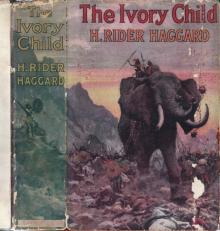 The Ivory Child
The Ivory Child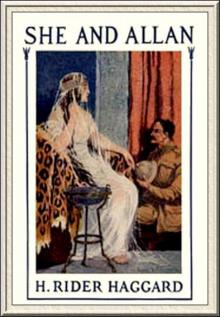 She and Allan
She and Allan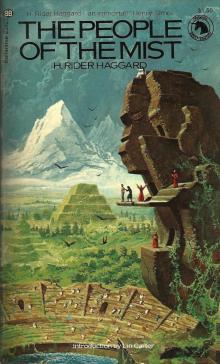 The People of the Mist
The People of the Mist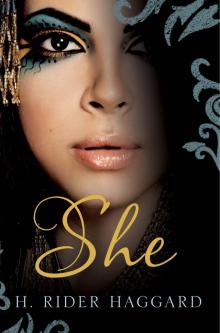 She
She Morning Star
Morning Star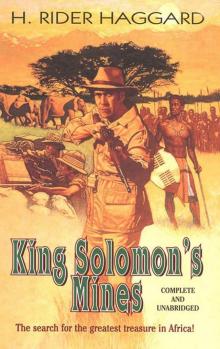 King Solomon's Mines
King Solomon's Mines She: A History of Adventure
She: A History of Adventure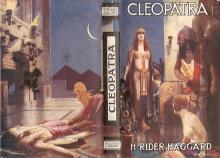 Cleopatra
Cleopatra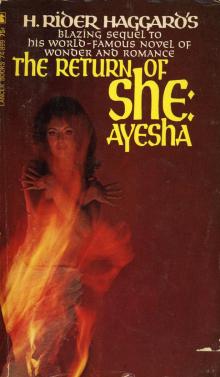 Ayesha, the Return of She
Ayesha, the Return of She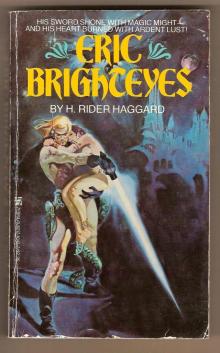 Eric Brighteyes
Eric Brighteyes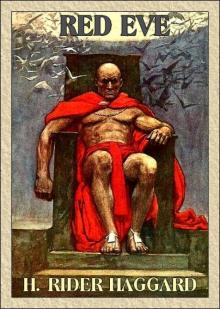 Red Eve
Red Eve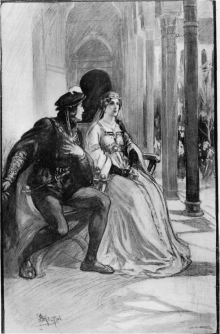 Fair Margaret
Fair Margaret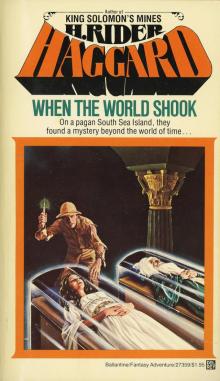 When the World Shook
When the World Shook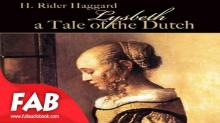 Lysbeth, a Tale of the Dutch
Lysbeth, a Tale of the Dutch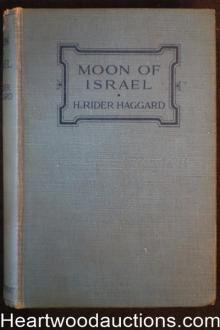 Moon of Israel: A Tale of the Exodus
Moon of Israel: A Tale of the Exodus Long Odds
Long Odds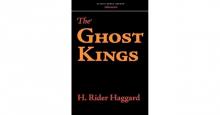 The Ghost Kings
The Ghost Kings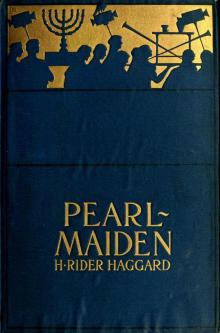 Pearl-Maiden: A Tale of the Fall of Jerusalem
Pearl-Maiden: A Tale of the Fall of Jerusalem Allan and the Holy Flower
Allan and the Holy Flower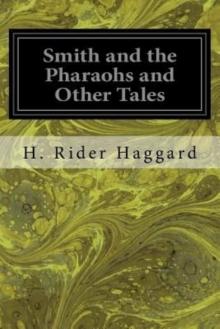 Smith and the Pharaohs, and other Tales
Smith and the Pharaohs, and other Tales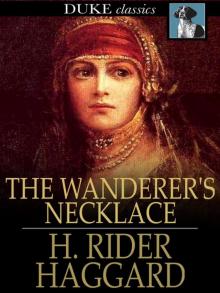 The Wanderer's Necklace
The Wanderer's Necklace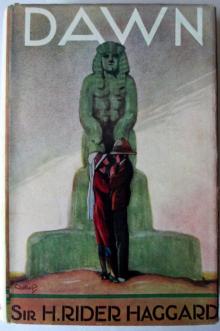 Dawn
Dawn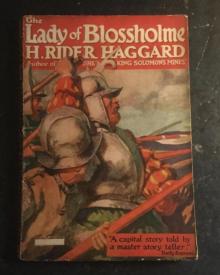 The Lady of Blossholme
The Lady of Blossholme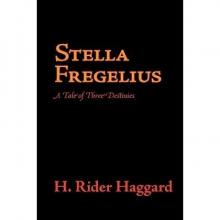 Stella Fregelius: A Tale of Three Destinies
Stella Fregelius: A Tale of Three Destinies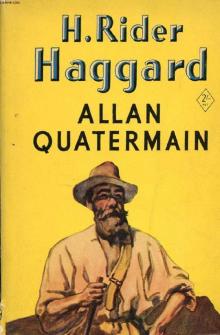 Allan Quatermain
Allan Quatermain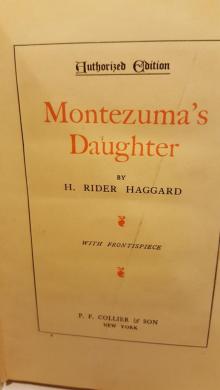 Montezuma's Daughter
Montezuma's Daughter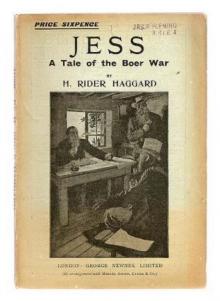 Jess
Jess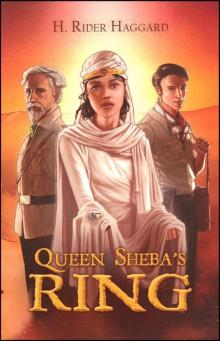 The Brethren
The Brethren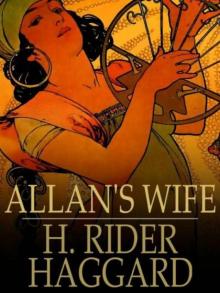 Allan's Wife
Allan's Wife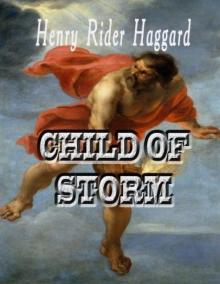 Child of Storm
Child of Storm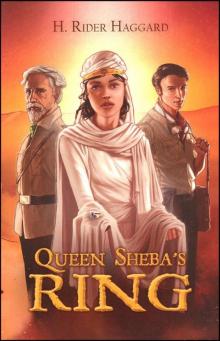 Queen Sheba's Ring
Queen Sheba's Ring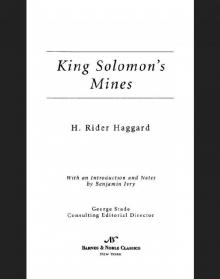 King Solomon's Mines (Barnes & Noble Classics Series)
King Solomon's Mines (Barnes & Noble Classics Series)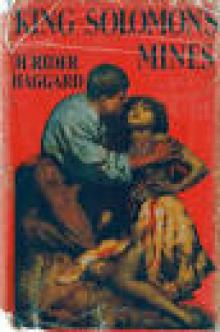 Complete Allan Quatermain Omnibus - Volumes 1 - 10
Complete Allan Quatermain Omnibus - Volumes 1 - 10